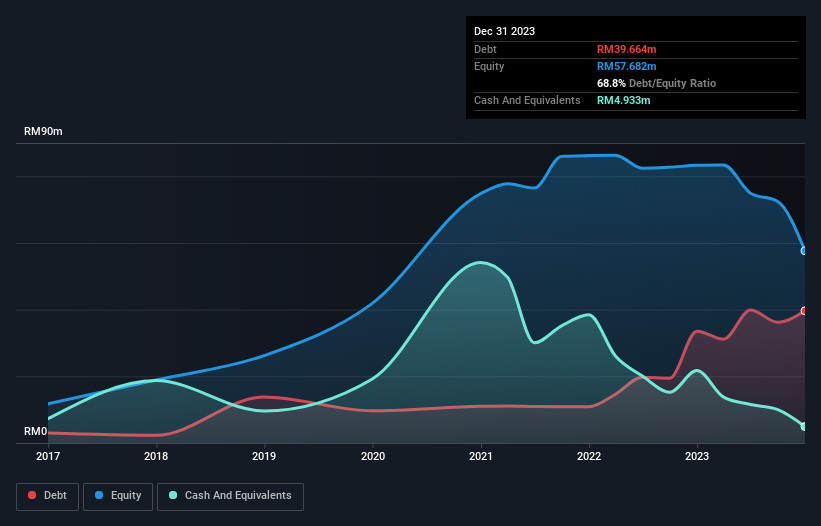Warren Buffett famously said, 'Volatility is far from synonymous with risk.' It's only natural to consider a company's balance sheet when you examine how risky it is, since debt is often involved when a business collapses. As with many other companies TCS Group Holdings Berhad (KLSE:TCS) makes use of debt. But should shareholders be worried about its use of debt?
Why Does Debt Bring Risk?
Debt assists a business until the business has trouble paying it off, either with new capital or with free cash flow. In the worst case scenario, a company can go bankrupt if it cannot pay its creditors. However, a more common (but still painful) scenario is that it has to raise new equity capital at a low price, thus permanently diluting shareholders. Of course, the upside of debt is that it often represents cheap capital, especially when it replaces dilution in a company with the ability to reinvest at high rates of return. The first thing to do when considering how much debt a business uses is to look at its cash and debt together.
See our latest analysis for TCS Group Holdings Berhad
How Much Debt Does TCS Group Holdings Berhad Carry?
The image below, which you can click on for greater detail, shows that at December 2023 TCS Group Holdings Berhad had debt of RM39.7m, up from RM33.6m in one year. On the flip side, it has RM4.93m in cash leading to net debt of about RM34.7m.

How Strong Is TCS Group Holdings Berhad's Balance Sheet?
According to the last reported balance sheet, TCS Group Holdings Berhad had liabilities of RM169.6m due within 12 months, and liabilities of RM19.6m due beyond 12 months. Offsetting these obligations, it had cash of RM4.93m as well as receivables valued at RM194.0m due within 12 months. So it can boast RM9.72m more liquid assets than total liabilities.
This short term liquidity is a sign that TCS Group Holdings Berhad could probably pay off its debt with ease, as its balance sheet is far from stretched. When analysing debt levels, the balance sheet is the obvious place to start. But you can't view debt in total isolation; since TCS Group Holdings Berhad will need earnings to service that debt. So if you're keen to discover more about its earnings, it might be worth checking out this graph of its long term earnings trend.
In the last year TCS Group Holdings Berhad wasn't profitable at an EBIT level, but managed to grow its revenue by 43%, to RM375m. Shareholders probably have their fingers crossed that it can grow its way to profits.
Caveat Emptor
Despite the top line growth, TCS Group Holdings Berhad still had an earnings before interest and tax (EBIT) loss over the last year. Its EBIT loss was a whopping RM28m. Looking on the brighter side, the business has adequate liquid assets, which give it time to grow and develop before its debt becomes a near-term issue. But we'd want to see some positive free cashflow before spending much time on trying to understand the stock. This one is a bit too risky for our liking. The balance sheet is clearly the area to focus on when you are analysing debt. However, not all investment risk resides within the balance sheet - far from it. To that end, you should learn about the 5 warning signs we've spotted with TCS Group Holdings Berhad (including 3 which are a bit concerning) .
Of course, if you're the type of investor who prefers buying stocks without the burden of debt, then don't hesitate to discover our exclusive list of net cash growth stocks, today.
Valuation is complex, but we're here to simplify it.
Discover if TCS Group Holdings Berhad might be undervalued or overvalued with our detailed analysis, featuring fair value estimates, potential risks, dividends, insider trades, and its financial condition.
Access Free AnalysisHave feedback on this article? Concerned about the content? Get in touch with us directly. Alternatively, email editorial-team (at) simplywallst.com.
This article by Simply Wall St is general in nature. We provide commentary based on historical data and analyst forecasts only using an unbiased methodology and our articles are not intended to be financial advice. It does not constitute a recommendation to buy or sell any stock, and does not take account of your objectives, or your financial situation. We aim to bring you long-term focused analysis driven by fundamental data. Note that our analysis may not factor in the latest price-sensitive company announcements or qualitative material. Simply Wall St has no position in any stocks mentioned.
About KLSE:TCS
TCS Group Holdings Berhad
An investment holding company, provides construction services for buildings, infrastructure, civil, and structural works in Malaysia.
Mediocre balance sheet with low risk.
Market Insights
Community Narratives



